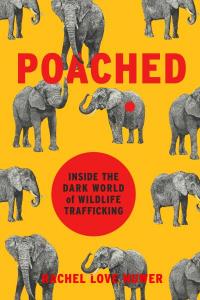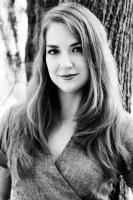Rachel Nuwer: Poached
For this column, NASW book editor Lynne Lamberg asks NASW authors to tell how they came up with the idea for their book, developed a proposal, found an agent and publisher, funded and conducted research, and put the book together. She also asks what they wish they had known before they began working on their book, what they might do differently the next time, and what tips they can offer aspiring authors. She then edits the A part of that Q&A to produce the author reports you see here.
Publication of NASW members’ reports in Advance Copy does not constitute NASW’s endorsement of their books. NASW welcomes your comments, and hopes this column stimulates productive discussions.
POACHED:
INSIDE THE DARK WORLD OF WILDLIFE TRAFFICKING
Rachel Nuwer
Da Capo Press, September 25, 2018, $28 hardcover, $17.99 e-pub
ISBN-10: 0306825503; ISBN-13: 9780306825507
Nuwer reports:
Illegal wildlife trade is a primary reason I became a science journalist. While researching poaching in Vietnam for my ecology master’s degree, I realized I would probably be more effective at telling people about it than I would be at producing scientific data.
Immediately after graduating from NYU’s Science, Health and Environmental Reporting Program, I knew I wanted to write a book about illegal wildlife trade. The agents and editors I approached, however, said the topic was too dark. Then a former professor’s agent came back from a trip to Kenya, determined to find an author to write about what she had witnessed.
After landing a contract with a publisher, I had just a year and a half to write the book. I knew early on that I’d have to find a way to avoid the text being overly depressing and bogged down in mind-numbing statistics, and also that I’d need to create some continuity in what otherwise could read as a disjointed laundry list of issues.I decided to put myself in the book, with each chapter a different adventure around the world. Reporting took me to a dozen countries and I wound up completely emptying my bank account in the process, but I’m convinced the field work was integral for both storytelling and for getting a fuller picture of the illegal wildlife trade.
If I could do it again, I would be more stringent about limiting the scope of what I set out to do (I wound up having to cut around 40,000 words—whoops!) and also be more realistic about the steep costs of travel and of stopping freelance work for months. That said, I am happy for the experience. It made me a better reporter and writer, and the depth of knowledge I acquired is orders of magnitude greater than it was before I set off on this journey. I would encourage aspiring writers to take the plunge if they find a topic they are truly passionate about and can afford to dedicate months or years of their life to seeing it through.
Contact info:
- Rachel Nuwer: 228-596-8843, rachelnuwer@gmail.com, www.rachelnuwer.com, @rachelnuwer
- Book website: https://www.dacapopress.com/titles/rachel-love-nuwer/poached/9780306825507/
- Blog website: www.rachelnuwer.com/poached/
- Agent: Jane Dystel, 212-627-9100, jane@dystel.com
- Publicist: Michael Giarratano, 617-263-2945, michael.giarratano@hbgusa.com
NASW members: will your book be published soon? Take advantage of this opportunity for shameless self-promotion. Submit your report for Advance Copy.
Tell your fellow NASW members how you came up with the idea for your book, developed a proposal, found an agent and publisher, funded and conducted research, and put the book together. Include what you wish you had known before you began working on your book, or had done differently.
See https://www.nasw.org/advance-copy-submission-guidelines.
Thinking of writing a book? If you are a NASW member, you may access a list of more than 150 books and online resources to help you craft your book proposal, find an agent and funding sources, negotiate your contract, learn about self-publishing, publicize and market your book, and more at https://www.nasw.org/article/write-book.
Send book info and questions about book publishing to Lynne Lamberg, NASW book editor, llamberg@nasw.org.





